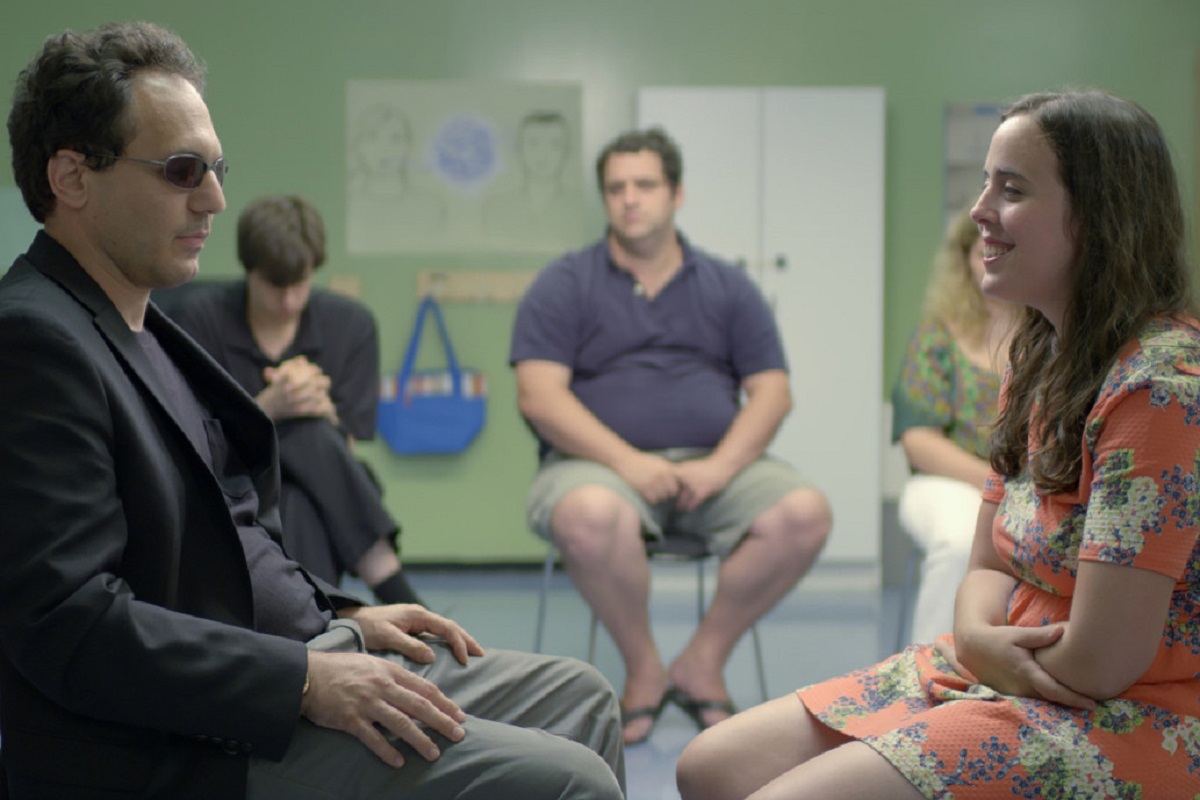Review: Keep the Change, a Nuanced and Hilarious Rom-Com Centering Adults With Autism
4 out of 5 stars.


In her new film, Keep the Change, writer-director Rachel Israel breathes new life into the romantic comedy by centering a community largely ignored in romantic storytelling: adults with autism.
Keep the Change tells the story of David Cohen (Brandon Polansky), a man who is struggling to come to terms with his own high-functioning autism when he unexpectedly falls for a vivacious woman named Sarah (Samantha Elisofon) whose lust for life both irks and fascinates him.
They meet at a support group for adults on the autism spectrum. Sarah is there by choice, because she’s a social butterfly who’s all about group activities, while David’s appearance there is court-mandated after an incident that involved telling a pig joke to a cop. To him, this community group is his worst nightmare.
He doesn’t see himself as “those people,” and doesn’t understand why anyone wouldn’t try to “be normal.” He’s there to do his time, and then his plan is to be out of there.
While David is initially turned off by Sarah’s enthusiasm for participation, Sarah is immediately attracted to David, and after using their group assignments as an excuse to hang out with him several times, she finally comes out and tells him that he’s “smokin’ hot” and “really sexy.” Thus begins their sweet and tumultuous courtship.
Israel and Polansky have been friends for over a decade, and the story is based on Polansky’s own real-life experiences with his first girlfriend. Israel decided that the only way she would tell this story is if Polansky was in it, and she made the very wise decision to cast amateur actors on the spectrum in all the roles of characters with autism as well.
The result is a journey that feels lived-in, nuanced, and real. In the hands of neurotypical actors, the film could’ve felt like obnoxious and insulting Oscar-bait. In the hands of Polansky and Elisofon, who worked from a script, but whose dialogue was largely improvised so they had the freedom to put things in their own words, the emotional beats ring true and achieve a level of humor that would’ve been impossible otherwise.
Also a joy, in addition to the humor of the film, is its unabashed sexuality. Both the protagonists, and the other members of their autism group, do not hold back when it comes to their sexuality. Particularly hilarious is a gay man in the group who has a huge crush on David’s cousin, Matt, who happens to be a well-known actor. This guy will not let it go, no matter how uncomfortable it makes David to hear his cousin talked about in sexual terms, and I just wanted this guy to find a “nice Jewish boy” so badly!
Yes, the protagonists have a love scene, and it’s sweet, and awkward, and also sensual and hot. It’s made even better by the fact that Sarah is clearly the more experienced of the two by a lot, and so she directs a lot of the action, much to David’s seeming relief.
What I love the most is that David and Sarah are not sentimental or in any way “inspiration porn.” David’s actually a huge asshole for most of the film. He’s a wannabe film maker who shows that male entitlement exists whether you’re on the spectrum or not. He’s clearly internalized his mother’s (Arrested Development‘s Jessica Walter) snobbish attitudes about the poor and those with autism who she deems low-functioning and needy. And so, he goes out of his way to try and hide his autism, and alternately judging or being embarrassed by Sarah. He’s falling for her “in spite of himself,” but is constantly trying to correct her behavior.
Sarah, while hugely endearing, kind, and in full acceptance of both her autism and her learning disability, also neglects to mention that she has several boyfriends. When David confronts her about why she never told him that he wasn’t the only one she was dating, she says something like, “I didn’t know how you’d feel about open relationships.” (Um, that’s not how you do open relationships, Sarah!)

And so, their relationship offers each of them something they lack. With David, Sarah is able to take more chances—like taking a cab instead of only taking the one bus she knows how to take to her grandmother’s house; like navigating a party even though she doesn’t really understand how jokes work—whereas Sarah teaches David that it’s okay to be honest about who you are, and the challenges you’re dealing with in your life. There’s no shame in asking for help when you need it.
Since David is the main protagonist, if this were a film about neurotypical people, Sarah would very much exhibit all the signs of a Manic Pixie Dream Girl: the perfect, bubbly, completely supportive woman there to “fix” the guy’s life. However, Sarah is so much more than that precisely because she and the protagonist share the same circumstances. She’s not a blank slate on which he can write his future. She’s a woman who shares his struggles and who, when she helps him, is doing so from a place of experience. Sarah is an amazingly nuanced female character, and I seriously think Elisofon should be cast in everything ever.
Watching David’s journey toward self-acceptance is fascinating, because you see that so many of the difficulties in his life have less to do with his autism than even he thinks, and more to do with his relationship to it, which affects his relationships with others. Polansky does a beautiful job playing the subtle nuances of David’s constantly shifting emotions: confident and cocky one minute, wounded and embarrassed the next.
If you’re looking for a film that is a refreshing look at the romantic comedy, one that adds an amazing female character to the Nuanced Female Character canon and gives voice to a typically marginalized community, I would highly recommend checking out Keep the Change.
Keep the Change, which won the Best U.S. Narrative Feature, Best New Narrative Director, and the Nora Ephron Prize at the Tribeca Film Festival, opens in New York TOMORROW at the Quad Cinema, in Los Angeles on March 23rd at Laemmle Town Center and Laemmle Royal Theatre, followed by a nationwide rollout.
(image: Kino Lorber)
Want more stories like this? Become a subscriber and support the site!
—The Mary Sue has a strict comment policy that forbids, but is not limited to, personal insults toward anyone, hate speech, and trolling.—
Have a tip we should know? [email protected]